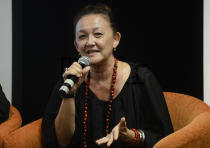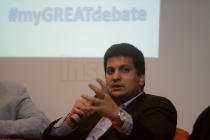Historical legacy not a hindrance to Malaysia’s progress, forum told
Malaysia's history and how it became a multiracial, multicultural and multireligious nation is not a baggage that will stand in the way of the country's progress, a forum was told last night.
However, according to Bukit Bendera MP Zairil Khir Johari, the country would need to make changes through inclusiveness and moderation.
He said it was up to the people whether they wanted to be trapped in negative legacies or to go with a new paradigm with greater democratisation that would empower the people.
Zairil, who was among the panel of speakers at "The Great Debate – Penang Edition: Is Malaysia's Historical Legacy a Hindrance to the Country's Future Development?" dialogue, higlighted that the historical legacy inherited by Malaysians today had given rise to the identity of the politics practised in the country.
"August 31, 1957, saw the birth of two different countries – Persekutuan Tanah Melayu and Malaya. Both carried different connotations.
"For one half of the population, they were told it was Tanah Melayu and what it meant. The other was told they were all Malayans, they have got this social contract and everyone belonged to one big happy family... then we had (the racial riots on) May 13, 1969. I think this is a really big historical legacy for us," he said.
Zairil, who is also Penang Institute executive director, said there were two national narratives right from the beginning, and after 1969, the differences became institutionalised and were manifested into public policies and today's ethno-religious hegemony.
"As a result, there is a system that recognised some Malaysians as being more Malaysian than others. How do you reconcile that? As a result, we have a really big identity crisis in Malaysia... what does being Malaysian mean?" he asked.
The DAP lawmaker said younger politicians on both sides of the divide, who were not championing racial politics or hung up by the May 13 incident, had been shifting discussions to policies, real issues and engaging in high quality debates in Parliament.
"I think that is the way forward as we move with a new Malaysian way of thinking and stop defining Malaysia's reality in racial terms," he said.

Rebecca Duckett-Wilkinson, a former Penang Heritage Trust council member, said managing interracial relations in a multiracial society had always been hard, even from the days of Captain Francis Light.
She said after eight years of developing Penang, Light wrote to the East India Company saying that the colonised island, which had a mixed community of 25,000 people, needed a proper government in place.
"Even then, he highlighted that it was tricky, having to handle the community of different races... It will always be tricky. It is still tricky today," she said.
Duckett-Wilkinson added that people were still so hung up about race, and being of mixed British and Chinese parentage, she was often asked to explain who she was, even after she had said she was a Malaysian.
Gerakan man Ivanpal Singh Grewal, who is the political secretary to Minister in the Prime Minister's Department Datuk Mah Siew Keong, said the nation's historical legacy was not a hindrance but a lesson.
"Malaysia, like all countries in the world, face our fair share of issues but what is more important is we are a country that is diverse in language, geography, religion and culture.
"The fact that we are all sitting here shows that we have done something right. We should be proud of ourselves. The problems Francis Light faced 300 years ago, I think we will continue to face them," he said.
Ivanpal said he believed in remaining true to 1Malaysia that celebrated unity in diversity, where all citizens could be Malaysians despite their differences; and urged the people, namely the silent majority in Malaysia, to play their part like speaking up against extremist views.
Another speaker, Arts Festival director Joe Sidek, who is famously known as the man behind the internationally-acclaimed George Town Festival, said people could make something of the legacies passed on to them, whether they were good or bad.
He also said the people should not depend on the government to lead the way in uniting the people, but to do it themselves by reaching out to others.
Responding to a question from a member of the audience, the panel of speakers also touched on the issue of whether national-type education or vernacular schools hindered national integration and on calls by some quarters to do away with it.

Ivanpal said the government chose to go with integration rather than assimilation, a decision that had allowed Malaysians of different races to preserve their cultural identities unlike in Thailand and Indonesia.
In that sense, he said, vernacular schools using Tamil and Chinese as the medium were part of the country's legacy, not a hindrance to unity.
Zairil said the real issue was the quality of education, not integration, as he knew of people who had attended Chinese schools and had no problems making friends with those of other races or religions, despite not having used much Bahasa Melayu or English until they were 17 or 18 years old.
"I have seen people go through national schools and end up as racists," he said, adding that national-type schools gave parents a choice to give their kids better education, as vernacular schools were performing better.
He also pointed out that the enrolment of non-Chinese pupils in Chinese schools had gone up by 10% while the "creeping ethno-religious agenda in national schools for the last 20 or 30 years" had been worrying parents.
Duckett-Wilkinson, a mother of three, said she personally felt that schools at primary level should not be separated at a stage where pupils were forming opinions about everything around them.
"Now the education system is sort of aggravating the problem of racial separation, and I would love to see in the future when all primary schools offer children the option to learn all their languages," she said.
The panellists also discussed how the study of history in schools had been politicised, and students were hardly taught in depth about Malaysia's own ancient Bujang Valley civilisation.
Cape Poetics Circle director Himanshu Bhatt, who is also a journalist, said our historical legacy was not a baggage, but it was the immediate legacy of our current policies that were creating the baggage.
He said the May 13 incident had not been a baggage for decades until recently when it was reignited by politicians. He said a threat to repeat the riots was made during a protest when a group of people invaded the state assembly building in May this year.
The dialogue was organised by the University of Nottingham's Institute of Asia Pacific Studies and Centre for the Study of Communications and Culture, Malaysia in association with the British High Commission in Kuala Lumpur and Penang Institute.
It was the first time the dialogue was held away from Kuala Lumpur. Last night's event was moderated by Shaarad Kuttan of BFM 89.9.
After the dialogue, British High Commissioner Vicki Treadall told The Malaysian Insider that there was no doubt that the economic development of Malaysia had been a success story.
Born in Ipoh, Perak, the 55-year-old new high commissioner said she had been back in Malaysia for regular visits, apart from having served as a junior third secretary with the high commission from 1985 to 1990.
From her experience with the country, she said Malaysia had been a warm, open and welcoming nation and that was still true today, with its people living in tolerance and acceptance.
"We do live in a more complicated world today, and that is not something unique to Malaysia. All governments have challenges, including the British government," she said, adding that she agreed with Zairil on the need for an inclusive narrative, something that Britain also needed to look into. – November 22, 2014.


